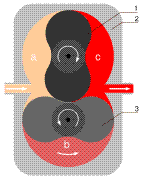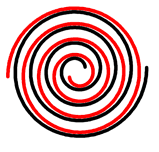|
|
||
pump
1- Positive displacement pumps force liquid to flow in volumetric proportion to decreasing pump volume. Hydraulic systems are a primary application, wherein the hydraulic fluid functions as the lubricant. Positive displacement pumps can be divided into reciprocating and rotary. Reciprocating pumps use pistons, plungers, or diaphragms to increase and decrease volume. Rotary pumps use a rotating device (gear, screw, or vane) to force liquid from the pump.
2- Centrifugal pumps, also called kinetic pumps, differ from positive displacement pumps in that they provide uniform (non-pulsing) flow and adjustable flow velocity. Movement is imparted to the liquid through centrifugal force created by a rotating impeller. There are two basic types of centrifugal pumps: radial flow and axial flow.
In the former type, liquid enters the pump at the impeller’s axis of rotation and is forced outward by vanes. In the latter type, a propeller or screw on a rotating shaft moves liquid in the axial direction of the shaft.
REAL Services 700 Portage Trail Cuyahoga Falls, OH 44221.3057 voice: 330.630.3700 fax: 330.630.3733 © 1995-2005 REAL Services® U.S.A. - Analytical Almanac All Rights Reserved |
||

